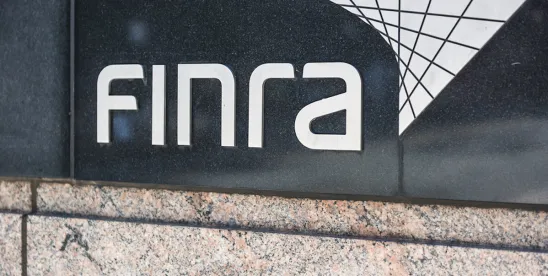FINRA’s Modernization Pitch: New Initiatives Aimed at Updating FINRA Rules and Easing Regulatory Burdens
On April 21, 2025, FINRA unveiled FINRA Forward, a broad review of its rules and regulatory framework that is intended to modernize existing rules regarding member firms and associated persons.
As part of its initiatives, FINRA is inviting significant engagement from industry members, seeking comments and feedback from member firms, investors, trade associations and other interested parties in an effort to update and adapt FINRA’s rules and regulatory standards to better suit the modern environment and the latest technologies used by member firms.
In a blog post, FINRA’s President and CEO, Robert Cook, wrote that FINRA “must continuously improve its regulatory policies and programs to make them more effective and efficient.”
FINRA has identified three goals of its FINRA Forward initiative: (1) modernizing FINRA’s rules; (2) empowering member firm compliance; and (3) combating cybersecurity and fraud risks. FINRA’s focus on modernizing rules will seek to eliminate unnecessary burdens on member firms, and to modernize requirements and facilitate innovation. With respect to compliance, FINRA aims to better protect investors and safeguard markets by enhancing the ways in which FINRA supports its member firms’ compliance efforts. Finally, FINRA is expanding its cybersecurity and fraud prevention activities.
The FINRA Forward initiatives were first previewed in Regulatory Notice 25-04, published on March 12, 2025, which identified two areas of initial focus for FINRA’s modernization effort: capital formation and the modern workplace. At the same time, FINRA requested comments for other areas FINRA should consider as part of its review. Following on the heels of Regulatory Notice 25-04, FINRA soon afterward published a series of more detailed Notices: Regulatory Notice 25-05, regarding associated persons’ outside activities; Regulatory Notice 25-06, which addresses capital formation; and Regulatory Notice 25-07, on the modern workplace.
We focus below on FINRA’s request for comments, in Regulatory Notice 25-07, on modernizing FINRA rules, guidance and processes for the organization and operation of member workplaces. This initiative promises a “broad rule modernization review” and “significant changes” to FINRA’s rules and regulatory framework “to support the evolution of the member workplace.” This modernization effort has the potential to significantly change regulatory compliance programs for virtually every FINRA member firm.
While noting that commenters “should not be limited by the topics and questions FINRA identifies,” FINRA has highlighted the following rules, guidance and processes on which it welcomes comments from industry members.
Branch Offices and Hybrid Work
FINRA is contemplating additional updates to FINRA Rule 3110 (the Supervisory Rule) in its continued effort to account for technological advances and hybrid working arrangements.
Just last year, FINRA amended Rule 3110 in response to changes in work arrangements, allowing members to designate eligible private residences as “residential supervisory locations” (RSLs) and to be treated as non-branch locations. FINRA also launched a voluntary, three-year pilot program that permits eligible members the flexibility to satisfy their inspection obligations under Rule 3110 without requiring an on-site visit to the office or location.
Now, in response to further feedback from members, FINRA is questioning whether the branch office and office of supervisory jurisdiction (OSJs) designations remain relevant in an age of digital monitoring, cloud-based systems and virtual meetings. Additionally, FINRA is asking if there are ways the Central Registration Depository (CRD) system and Form BR can be revised to “better align FINRA, other SRO and state requirements for broker-dealers with the uniform branch office definition and registration and designation of offices and locations.”
Registration Process and Information
Associated persons and member firms submit information to SROs and state and federal regulators through Uniform Registration Forms that communicate this information to FINRA’s CRD system. Notice 25-07 is now seeking comments on proposed changes to the process and systems currently in place to address modern technologies and workplaces, as well as the substance or presentation of the information provided to the public. These contemplated changes could impact such forms as Form BD and Forms U4 and U5.
Qualifications and Continuing Education
All securities professionals seeking registration must demonstrate the necessary qualifications by passing a standardized professional examination. After they are registered, these professionals are required to maintain their qualifications by completing a Continuing Education (CE) program that is designed to ensure that registered persons stay current as industry standards and rules evolve.
From time to time, FINRA has adapted its qualification and CE requirements to account for improvements in technology, learning theory and assessment methodologies. For example, in 2022 FINRA responded to the increased frequency of job changes and member restructures by implementing the Maintaining Qualifications Program (MQP) for individuals that have decided to temporarily step out of roles that require active registration. Members have taken advantage of the MQP since its launch in 2022, with approximately 38,000 individuals participating in or having participated in the program.
Now, FINRA is seeking input on further improving the CE program and exam framework to better serve the industry. Among other things, FINRA is asking whether registered persons should be allowed to take certain qualification exams without needing firm sponsorship. More generally, FINRA is also asking whether new technologies can be leveraged to identify appropriate candidates for positions that require registration and whether it should consider any changes to the CE and MQP to ensure that it is meeting the needs of its members.
Delivery of Information to Customers
As digital communication becomes the standard in customer engagement, FINRA is examining whether its existing rules on document delivery and account transfers still make sense in an increasingly paperless world.
The current rules, based on guidance issued decades ago, require firms to obtain informed customer consent before delivering documents electronically — an approach that can be cumbersome given how digitally savvy most investors now are. At the same time, rules around account transfers — especially those using “negative consent” (where the transfer proceeds unless the customer objects) — remain narrow, even though business needs often demand flexibility. For instance, when firms exit a business line or shift clearing arrangements, obtaining affirmative consent from every affected customer may be logistically impossible, creating risk and delay.
FINRA is now asking whether more flexible, principles-based standards should replace rigid prescriptive ones, particularly regarding negative consent scenarios. FINRA is also exploring whether its rules should be better aligned with those in the investment advisory world, where digital delivery and flexible account transfer protocols are more common. These questions are particularly relevant as firms use mobile apps, dynamic disclosures and automated notifications to streamline service. At the same time, FINRA must ensure that these innovations don’t compromise privacy, security or investor understanding. By opening this discussion, FINRA aims to support a future-ready regulatory environment where efficiency and investor protection go hand in hand.
Recordkeeping and Digital Communications
With the explosion of digital communication channels, broker-dealers face growing challenges in complying with recordkeeping requirements under both SEC Rule 17a-4 and FINRA rules. From emails and instant messages to Zoom meetings, AI chatbots, and interactive websites, the range of communications that may be deemed “business-related” has expanded dramatically.
“Off-channel” communications — messages sent through unauthorized apps or platforms — remain a major concern. These communications pose compliance and enforcement risks, and can lead to gaps in supervisory oversight. Similarly, as firms adopt generative AI tools for customer engagement or internal operations, questions arise about whether those communications need to be retained and how best to do so. For example, should chatbot responses or AI-generated meeting summaries be archived the same way as emails? What about dynamic content on websites that changes based on user behavior? The goal is to ensure that recordkeeping rules remain effective and clear in a multiplatform, mobile-first environment.
Rather than creating new obstacles to innovation, FINRA wants to promote best practices and enable compliance through thoughtful modernization. Member feedback will be vital in identifying pain points, sharing successful approaches following the recent off-channel communication enforcement actions by the SEC, and recommending specific rule or guidance updates that strike the right balance between oversight and adaptability.
Compensation Arrangements
FINRA draws attention to two particular types of compensation arrangements where existing rules and regulatory frameworks may be ripe for change.
First, compensation arrangements related to personal services entities (PSEs) have recently come under scrutiny. PSEs are legal entities, such as limited liability companies, that are often formed by registered representatives as a vehicle to receive compensation for the representatives’ services, while also achieving tax benefits and other benefits. The problem with this compensation arrangement is that, under existing guidance, receipt of transaction-based compensation traditionally has been a strong indicator of broker-dealer activity. As a result, member firms often have concerns about paying transaction-based compensation directly to PSEs, because of uncertainty as to whether doing so could require the PSE to register as a broker-dealer and/or violate the member firm’s duty to maintain supervisory control over the securities-related compensation paid directly to registered representatives.
Second, there has been a recent rise in programs that pay continuing commissions to retired registered representatives or their beneficiaries. Under existing rules (in particular Rule 2040(b), however, such compensation arrangements are valid only if the registered representative contracts for such continuing commissions before an unexpected life event that renders the representative unable to work.
FINRA is seeking comments on potential regulatory or rulemaking changes that could facilitate these types of compensation arrangements, or ease the regulatory burden associated with them, while still continuing to preserve effective broker-dealer supervision.
Fraud Protection
FINRA is considering changes to existing rules designed to help prevent fraud.
In particular Rule 2165 currently allows firms to place temporary holds on account activity — in the accounts of a “specified adult” — when the firm reasonably believes that financial exploitation of that adult has occurred or is occurring. But these temporary holds are subject to time limits, which can sometimes constrain the firm’s ability to protect customer assets, such as when the firm is unable to convince the customer that financial exploitation is occurring, or when an investigation has not yet concluded. Thus, FINRA is exploring whether to expand the time limits, or to extend the application of Rule 2165 beyond “specified adults.”
FINRA is also seeking comments on ways to potentially modify or enhance Rule 4512, which requires firms to make efforts to identify a “trusted contact person” for all non-institutional accounts — i.e., a person whom the firm can contact when a customer is unavailable or becomes incapacitated.
Leveraging FINRA Systems to Support Member Compliance
Member firms can currently employ FINRA’s systems in a variety of ways to support their compliance efforts, including relying on the CRD system, FINRA’s verification process, the Financial Professional Gateway, and the newly launched Financial Learning Experience to satisfy certain of their regulatory requirements.
As part of the FINRA Forward initiatives, FINRA is seeking feedback on other ways that FINRA can use its systems to reduce costs and burdens on member firms.
FINRA is requesting that all comments be submitted by June 13, 2025, and comments will be posted publicly on FINRA’s website as they are received.




 />i
/>i
